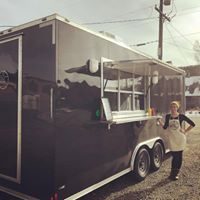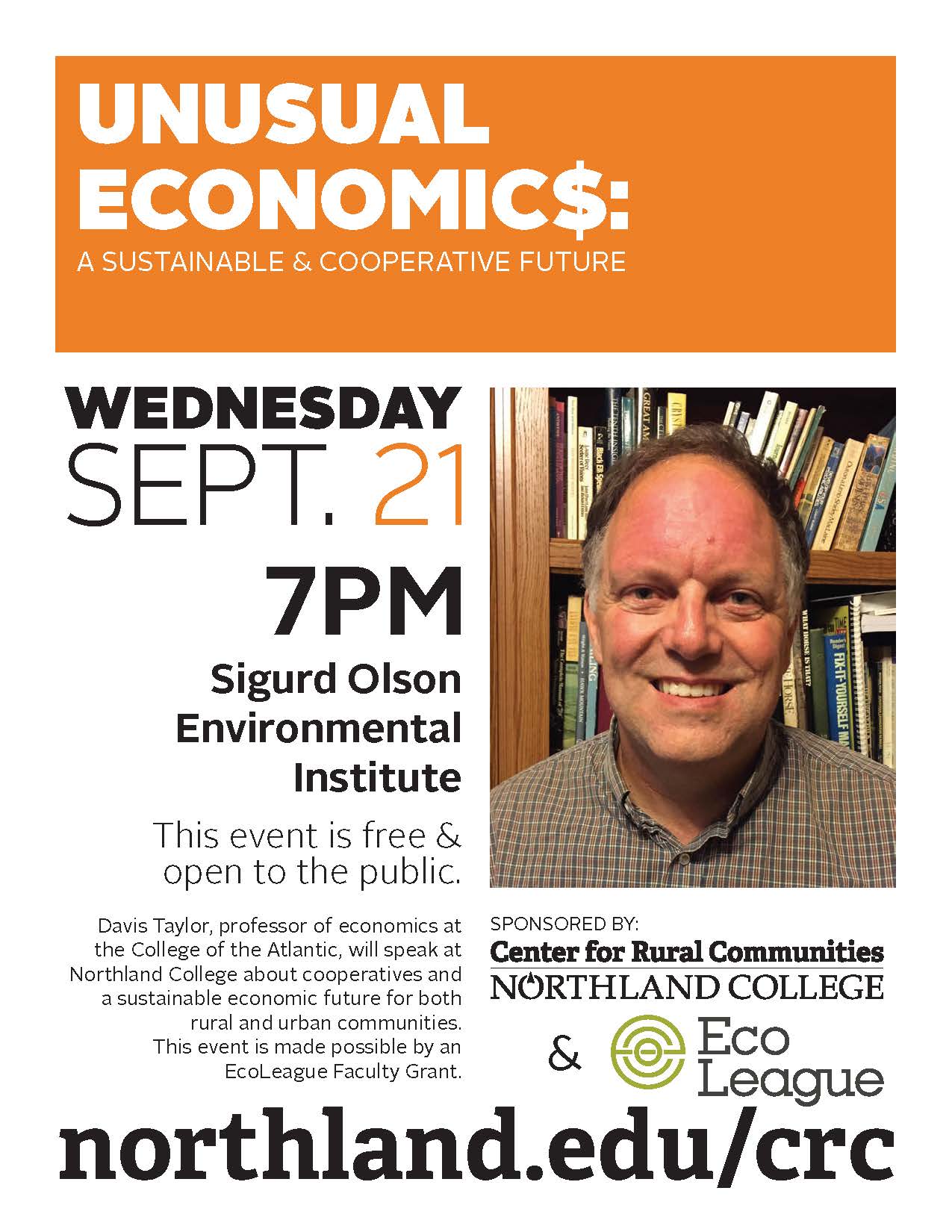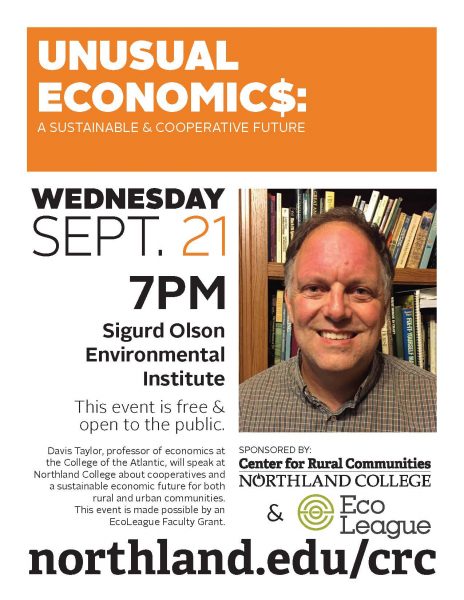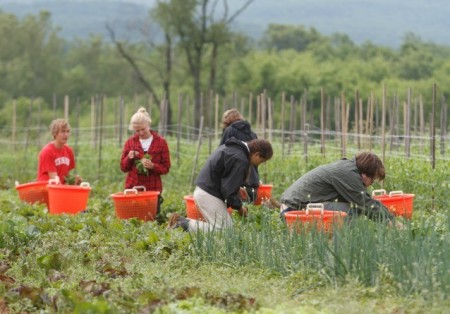GMC’s Kara Kessler ’11 Graduates from EcoLeaguer to Sustainable Entrepreneur

by EcoLeague Communications and Digital Media Assistant Claire Jeantheau, Dickinson ’21
Kara Kessler, a 2011 graduate of Green Mountain College, currently manages her own vegan food truck and holds a passionate interest in human relationships with the natural world. But discovering this path wouldn’t have been possible without her two-time exchanges through EcoLeague, marked by their experiential activities.
When she entered her first year at Green Mountain, Kessler was certain that she would study psychology—the high school class she found most interesting. After a “spontaneous” decision to go on an EcoLeague exchange in fall 2008 to Northland College, she learned the value of studying a broad mix of subjects.
“Green Mountain College had six hundred people at the time, so I decided that it’d be good to get out. And then I got [to Northland] and realized the importance of different areas of study, different professors,” Kessler recalled.
Kessler’s classes at Northland ranged from art and literature to adolescent psychology. However, it was a seminar on ecopsychology—a field examining relationships between humans and the natural world—that she found “the most intriguing, interesting, and defining”.
“I had a professor suggest ecopsychology,” Kessler explained, “and I had never heard of that, but it sounded very interesting. And so I studied ecopsychology… that’s when I realized I know what I want to do, I know what I want to learn more about.”
Having found her academic interest, she made the distinctive choice of completing a second EcoLeague exchange, this time at Prescott College in Fall 2010. By completing two exchanges, she was able to study ecopsychology in depth, particularly through her coursework at Prescott. Kessler credits EcoLeague with giving her the opportunity to discover a field that she wouldn’t have been able to explore at her home college.
“After my first EcoLeague experience, I realized … I can’t study [ecopsychology] at Green Mountain College, I’m going to pursue that individually, I’m going to research and tailor my degree to it.”
Because of EcoLeague’s experiential nature, many of Kessler’s favorite memories of her exchanges took place outside of the classroom. At Northland, she enjoyed studying near Wisconsin’s Lake Superior, a new environment from her home college in Colorado. There, she fondly remembers hiking in local wildlife and seeing the area’s aspens in the fall.
Later at Prescott, where she “got to take a lot of field trips,” she began her semester with a trip to Northern California to study sea psychology and marine biology for a month. The experience was made possible by Prescott’s unique schedule, which begins with an intensive three-week “Block” class before a typical pattern of semester classes.
Kessler now applies the interest in ecopsychology she cultivated in EcoLeague as the owner and operator of a vegan food truck. The Vegetable Express is based in Nederland, Colorado, and describes its goal on social media as “feeding your mind, body, and soul with plant-based foods.”
“On a different level, sustainably, I can heal the planet this way through plant-based eating, and I’m connecting to people and helping people psychologically through food. It’s been about how you relate to it, how you see it,” Kessler said, tying her EcoLeague studies to her current work. “[EcoLeague] definitely prepared me to do what I’m doing.”
If you are passing through Nederland, don’t forget to stop by Kessler’s Vegetable Express to support sustainability and, more importantly, to nurture the mind and body!
New EcoLeague Jobs Board

The EcoLeague is proud to announce our new Jobs Board. This is a joint project between our six consortium colleges, with all of the Internship and Job Coordinators working together and contributing postings from each institution’s many opportunities. The EcoLeague Jobs Board is unique in that all the postings relate to the environment or sustainability in some way. Through this collaboration we are able to provide our students greater access to internships and jobs across the USA. We hope that you will take the time to look at this jobs board, which you can find in the menu on our website.
EcoLeague Faculty Scholar Davis Taylor to Speak At Northland College

 Unusual Economics: A Sustainable and Cooperative Future
Unusual Economics: A Sustainable and Cooperative Future
Davis Taylor, professor of economics at the College of the Atlantic, will speak at Northland College about cooperatives and a sustainable economic future for both rural and urban communities Wednesday, September 21 at 7 p.m. at the Sigurd Olson Environmental Institute.
This event is sponsored by the Northland College Center for Rural Communities and the EcoLeague, a consortium of six colleges and universities that share missions based on environmental responsibility and social change, including College of the Atlantic and Northland College. Davis’ visit is made possible by an EcoLeague Faculty Scholar Grant, which encourages faculty at member schools to collaborate with each other in areas of teaching and research across institutions.
Taylor pursues research in various forms of economics as well as sustainable community development. He has presented papers that expand upon the concepts of community and model the human ecology of forests. His current research efforts include the economics of food systems, the role of institutions in shaping economic development, and the ecological economics of resource collapse.
This event is free and open to the public.
EcoLeague Schools Gain Praise for Green, Environmental Programs

Four EcoLeague Colleges made media lists as green colleges with strong environmental programs recently. Northland College was listed as number one in Mother Nature Network‘s special feature “10 of the Best College Environmental Programs in the U.S”. Green Mountain College and College of the Atlantic were also highlighted; EcoLeague Consortium Schools comprised over a third of the colleges represented in the article. In MNN’s “17 Amazing Green College Campuses” both Dickinson and Green Mountain College were praised for their farm-to-cafeteria programs.
Some highlights from the features:
Northland College: “At Northland College, environmental studies isn’t just a major — it’s a part of the school’s education requirements across all curricula. The Environmental Sciences Department offers majors in environmental chemistry and environmental geosciences; the Natural Resources department includes emphases on ecological restoration, fisheries ecology, and wildlife ecology; and the Nature and Culture Department allows majors in outdoor education, humanity and nature studies. The Sigurd Olson Environmental Institute brings environmental responsibility to the surrounding community, and since 1971 the school has stressed sustainability across the board: Classes like sustainable business, sustainable agriculture, and renewable energy prepare students for a green future, while an off-grid building insulated with straw bales and an eco-friendly residence hall that was a prototype for the LEED rating system help them understand sustainability now.”
College of the Atlantic: “While the other colleges on this list offer a wide variety of environmentally-related degrees, College of the Atlantic takes the opposite approach: Students share one major — human ecology — and then tailor the course load to his or her own specific interests. Social and environmental issues take center stage though, as all the students are expected to address them through their self-designed curriculum and senior project; examples of past projects include a photographic exhibit based on the birds of Hawaii; one student’s wilderness immersion trip along a Virginia creek; and a multimedia fundraiser for a Zimbabwean nonprofit.”
Green Mountain College: “This Vermont school is the first U.S. college to achieve climate neutrality through campus-wide efficiency, adoption of clean energy, and purchase of local carbon offsets. Every course of study has environmental, social and economic sustainability as an overall theme and nearly half of all graduates end up with green careers. The campus generates 80 percent of its heat from a $5.8 million biomass plant that burns locally harvested wood chips, and the school plans to meet all of its energy needs with 100 percent renewable energy by 2020. Green Mountain is also a leader in sustainable farming education. The campus 21-acre Cerridwen Farm supplies produce for the dining hall where food scraps are later collected and used as compost for the farm.”
Dickinson College: “Student farmers grow organic vegetables and raise free-range livestock on this Carlisle, Pennsylvania, school’s 50-acre USDA certified-organic college farm. Food from the farm is served in the dining hall, sold at a local farmers market, and donated to a community food bank. Each day 800 pounds of food waste is sent back to the farm to be converted into compost, cutting in half the volume of waste sent from the dining hall to landfills. The college offers more than 100 sustainability courses, integrated throughout the curriculum and across many majors. In 2013-14, nearly 60 percent of students took at least one sustainability-related course. The school has created a Climate Action Plan to achieve climate neutrality by 2020.”

